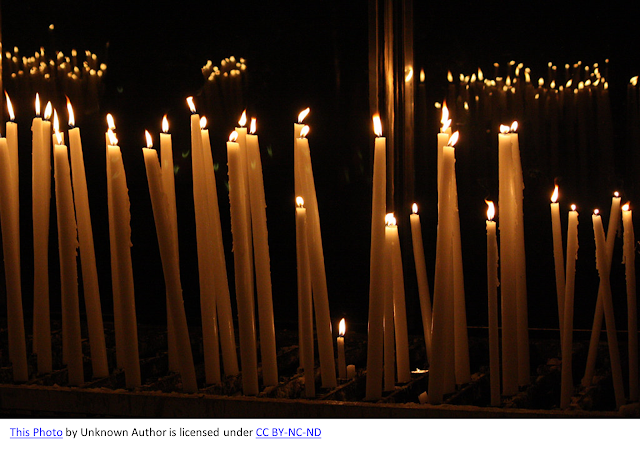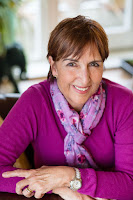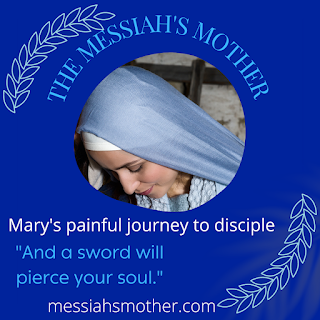MARY AND CANDLEMAS AND PIDYON HABEN by Bobbie Ann Cole
Yesterday was Candlemas. This festival has been celebrated on 2nd February since the 5th century. It is still celebrated today by Anglicans, Catholics and other denominations.
Candlemas brings light to mid-winter through candles lit at churches to symbolize Jesus as the Light of the World. The original meaning of this festival, however, was to mark forty days from Christmas, considered the birthday of Jesus.
Luke’s Gospel (2:22-40) tells that, on this day, Mary and Joseph went to the Jerusalem Temple for her Purification after Childbirth, in accordance with Torah, (Lev. 12), and for the Redemption of the Firstborn (Pidyon haBen) for Jesus.
The Redemption of
the Firstborn remembers how God saved the firstborn male Israelite slaves from the
Angel of Death, who passed over their homes, whose doors were daubed with the blood
of a lamb, at the time of the Tenth Plague of Egypt.
Ever since, firstborn
sons have been deemed to belong to God, unless redeemed by their families. Everyone,
except the priests of the Land, was required to do this for their firstborn
males. In Jesus’ time the ceremony took place at the Temple with money and a
form of words.
On any given day,
the area around the fifteen semi-circular steps leading up to the gleaming,
copper Nicanor Gate in the Court of the Women must have been heaving with
parents and babies, waiting for a priest to redeem their son. Many of the mothers
would, like Mary, have been little more than children themselves, in their
early teens.
Mary must
have been thinking with relief that her problems and challenges were behind
her. She had faced pregnancy of an apparently illegitimate child. The society
of the time had a strict, honour-shame code. Mary, having brought shame on her
family, risked stoning. At the very least, she could have been cast out,
especially as her betrothed, refusing to acknowledge that he was the father,
had wanted to break off the engagement.
All
seemed to be turning out well at last, however. She was a wife, a mother, a fertile
daughter of Israel, all the things most Jewish women of the time wanted for
themselves. She had status. She was blessed.
Jesus’ redemption
ceremony was carried out by a well-known elderly priest named Simeon, whom the
Holy Spirit had called upon to be there. God had promised that he would meet
the Messiah before he died. The moment he saw Jesus, he recognised him and declared
to Mary and Joseph he was the long-awaited Messiah.
This was a confirmation
of what Mary already knew, through her son’s miraculous conception (Luke 1).
Simeon understood that
the Messiah would not be welcomed by everyone. He prophesied: “This
child is destined to cause the falling and rising of many in Israel, and to be a sign that will be spoken against.” Many
would disapprove of him, even hate him.
This
was not easy to hear but it was vague and about some unknown time. What
followed was directed at Mary and more immediately telling.
“Mary,
you, too,” Simeon said, “A sword will pierce your very soul.”
Her
troubles were not at an end, as she had thought. They were only just beginning.
Bobbie Ann Cole, Christian author, speaker and writing teacher, is writing The Messiah’s Mother, a first-person ‘memoir’ of Mary’s painful journey from mother to disciple during Jesus’ ministry. Find out more at http://messiahsmother.com




I would have loved to meet Simeon (and Anna). Amazing to think of them spending so much time in the temple, waiting for the Messiah - and then instantly recognising Him when He appeared!
ReplyDeleteIn The Messiah's Mother, I have elderly Anna prophesying over baby Yeshua in the mikvah. She is holding him for Mary who is immersing herself in preparation for her Purification after Childbirth.
DeleteThank you so much for given us information on the redemption of the first born son! Also, many people like me were ignorant of yesterday being candlemas! When I was still a baby Christian, I used to think it was very cruel of the Simeon the priest, to openly tell young Mary such harsh words at a joyous time of dedicating her son. She must have been horrified, confused and wondering what all that meant! I know you are writing about Mary and may have expressed in detail how she and Joseph had felt to hear the priest saying such awful things instead of rejoicing with the couple! I guess this is symbolical of the Christian journey full of temptations and a heavy cross to bear but victory comes at the end as it did for Christ! Thanks for this lovely post!
ReplyDeleteHi Sophia - I do have Joseph whisking Mary away a bit abruptly because she's taken aback by his 'sword will pierce your heart'.
DeleteWhat has fascinated me for a long while is, although a Messiah had long been anticipated by Israel, his coming had been foretold, only Simeon and Anna really did wait for him, expectantly, and identify him when they met him.
ReplyDeleteI wonder if one could link that to today and any day, as Jesus still comes. How many people anticipate his coming to them.
Don't you think that the disciples showed that they were waiting for the Messiah, and John the Baptist, too?
DeleteLots of fascinating history here. Thanks for sharing.
ReplyDeleteI learned so much! What an interesting post. I knew about Candlemas but had no idea about firstborns being redeemed. Every day's a school day. Thanks, Bobbie!
ReplyDeleteGod bless you, Ruth. Thank you.
DeleteA very informative blog, I am so looking forward to your book!
ReplyDeleteJust getting up to when Jesus came to preach in Nazareth and almost got himself murdered. Imagine being Mary at that time!
DeleteA very welcome reminder that firstborns belong to the Lord as my own is about to head off to the States for 3 months travelling. Thank you Bobbie
ReplyDeleteLiz, Mary's story is relatable. I know I've felt the separation from in particular my firstborn, eldest son, as he grew into a man. In Jesus' case, Mary must have felt this particularly acutely. Because he came to save everyone, he needed to distance himself from her. Yet for years, since the death of Joseph, they had lived together as joint heads of the household, a platonic couple. My take is that she felt this particularly acutely.
Delete